The best games of the past decade
Tom Breedveld
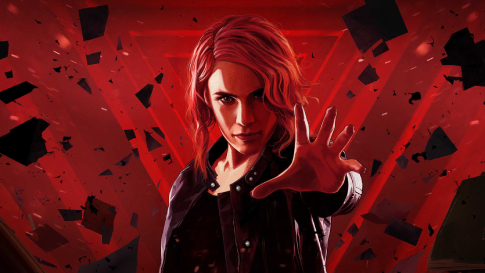
Well, 2020 is off to a great start. We’re all going to die in the next World War. The memes on the internet are pretty good, though. Discussion in electronic entertainment circles is rife with whether or not video games will have given us any discernible war skills, and in what way we’re supposed to pwn Iranian n00bs.
Yes, once again its clear that this gamer generation is the most oppressed societal group. From situations like Gamergate to the accusation of several prominent figures in the game industry, it doesn’t seem like games, and more directly their constituency, are going to be taken seriously for a while. Even the term ‘gamer’ has become kind of a dirty word (but don’t worry, if you’re one of those people who just plays mobile games all day, you’re not a gamer).
Combine with this the recent deterioration of gaming practices, such as the debacle of micro-transactions that even led to questions from the U.S. Senate, and the bad press for several game developers because of delivering clearly broken and unfinished products and losing the trust of their fanbase, and one wonders what we’re still doing it for.
Enriching experiences
So, to wrap up this introduction, here’s my top 10 best games of the past decade, in an effort to show that intriguing and emotionally rich stories are perfectly capable of being told through the medium of video games. Rest assured that the above problems mostly focus on the sinkhole that is multiplayer gaming, an abyss that I have steadfastly avoided since the beginning of my gaming career in favor of interesting single player experiences. Like curling up with a good book or going to the cinema, it is certainly possible for video games to offer enriching experiences, if you’re willing to let it. To paraphrase a person on the Internet: ‘This generation wouldn’t last five minute in a Modern Warfare-lobby’. Well, perhaps not, but why would you want to?
So, without further ado, the best gaming experiences, and some gaming history, of the New Tens:
10. Fallout: New Vegas (2010, Obsidian Entertainment)

I’ve loved Fallout ever since I received the third installment for Christmas thirteen years ago. The game series, set in a post-apocalyptic wasteland after a nuclear resource war between the US and China destroys most of the world in 2077, can be seen as a love letter to Mad Max, the aesthetics of the 50s, and the wry humor of Monty Python.
Bethesda Game Studios, responsible for Fallout 3 and 4, have recently received a lot of flak for the rather abysmal release of Fallout 76, a broken, glitched, boring quasi-multiplayer experience that ruins everything good about Fallout and has added microtransactions as an extra kick in the face. I had fun with it. Bethesda has been lambasted for killing the Fallout-series ever since they took over from the original creators, most of whom have come together to form Obsidian Entertainment.
Obsidian were allowed to make one more Fallout-game before they had to permanently say their goodbyes, and they brought us the universally loved Fallout: New Vegas. I’ll be honest – it didn’t do much for me when I first played it.
While I will admit Bethesda kind of took the challenge out of Fallout 4 in order to cater to the lowest common denominator and sell more copies, I liked Fallout 3 for being a challenging exploration game in which I discovered exotic locales and did quests for memorable characters. Fallout: New Vegas kind of misses the aspect of freedom and exploration, and I never felt I was allowed to do what I wanted, forever blocked by tough challenges that seemed to try and reward fighting for progression.
However, New Vegas’ postapocalyptic look at Las Vegas in a very strong main questline that finds you tracking down the man who shot you in the head before joining one of four factions (the bureaucratic New California Republic, the fascist and Roman Empire-inspired Caesar’s Legion, the zealously capitalist Robert House, or striking out on your own with a robot army) in order to take over control of the land, with strong dialogue and unique encounters, is certainly a testament to RPGs of yore, and makes the player feel like a hero of their own story like a good RPG should. I’ll learn to love you yet, Fallout: New Vegas, and I can already see the impact you’ve had on the gaming industry.
Obsidian recently struck out with their own RPG, The Outer Worlds (2019), and for those who prefer fantasy to sci-fi, Bethesda’s The Elder Scrolls-series, going strong since 1994, has so far escaped much scrutiny.
9. Portal 2 (2011, Valve Corporation)

The best comedies in existence are The Meaning of Life (1983) by Monty Python, The Big Lebowksi (1998) by the Coen Brothers, Duck Soup (1933) by the Marx Brothers, Catch-22 (1961) by Joseph Heller, and Portal 2 (2011) by Valve Corporation.
Valve is in the business of changing the gaming industry with every game they bring out, the high point being their release of Half-Life in 1998 (a fantastic year for games), which defined all first person shooters to follow and was recently remade by fans as the gorgeous Black Mesa (2012), a testament to the ingenuity and love of the fan base. Wanting to create a new kind of puzzle game, Valve made a spin-off of Half-Life called Portal (2007). In Portal, science company Aperture Science has been taken over by a rogue AI called GLaDOS, who forces main character Chell to test teleportation technology by solving puzzles with portals. It’s intense, it’s intelligent, and most importantly, it’s hilarious.
Joining the sequel are J.K. Simmons (known for his role as hot headed J. Jonah Jameson in Sam Raimi’s Spider-Man films) as Cave Johnson, a megalomaniacal CEO whose voice messages give a good idea of why Aperture Science crashed and burned, and Stephen Merchant, co-writer of the British Office, as geniously incompetent AI-construct Wheatley. Chell and Wheatley try and stop GLaDOS once again while solving challenging puzzles, but the main selling point is the dialogue between sociopathic GLaDOS and idiotic Wheatley, with egotistical Cave Johnson as a delightful intermission.
I recently introduced this game to party guests on my birthday (all were immediately hooked), and realized how often I quote this game without knowing it, from Cave Johnson’s speech about life handing you lemons (‘Make life take the lemons back! Demand to see life’s manager!’), to GLaDOS’ perfect insults and threats (‘Look. We both said a lot of things that you’re going to regret.’ ‘Burning people! He says what we’re all thinking!’ ‘You like revenge, right? Everybody likes revenge!’ ‘Science has now validated your birthmother’s decision to abandon you on a doorstep.’) to Wheatley’s undeserved optimism in the face of constant failure, which I identify with on a spiritual level (‘Oh, that just washes right off, does it? That would have been nice to know – a little earlier.’ ‘I’m still in control, and I have no idea how to fix this place!’)
The game is a hoot and a larf, a goof and a gaff, and it’s also a brilliant puzzle game with extremely intricate design. Play it with the commentary track on sometime, and you’ll learn an incredible amount about building a game.
8. Dead Space 2 (2011, Visceral Games)
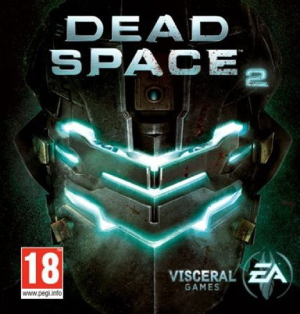
Dead Space 1, with its selling point of dismembering reanimated corpses in space, was a cool, but rather run-of-the-mill game. Jump scares accompanied by screeching violins do not revolutionary horror make. The creators of the game apparently realized their own weakness, and so Dead Space 2 became a gory action game full of wonderful set pieces that get your adrenalin pumping.
The game puts you in the shoes of Isaac Clarke, who is held captive by the government on a space installation near Saturn. There, experiments are conducted on strange alien technology that might solve the Earth’s resource problems, but which mostly reanimates the dead as deadly necromorphs. The player is thrown from one balls-to-the-wall situation to another, and before you know it, you’re knee deep in zombie guts.
The game is also gorgeous, as flying around in space leads to breathtaking visuals. Isaac’s companion during the game is Ellie Langford, one of the best written strong female characters in media (video games have more and better strong female characters than people think, as these past two entries exemplify).
Unfortunately, Visceral Games was owned by EA, the destroyer of good game series. Dead Space 3, in a completely misguided effort to boost sales, was turned into an uninspired cover shooter that ruined Isaac Clarke’s character arc and turned Ellie into a nagging damsel in distress. I will never forgive EA for robbing me of a satisfying continuation of one of my favorite horror stories of the decade. Fuck you, EA.
7. Batman: Arkham Origins (2013, WB Games Montréal)
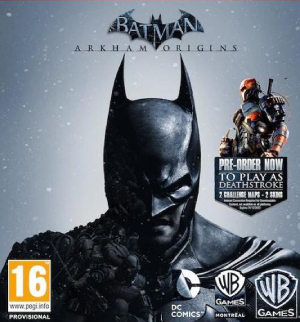
A contentious item next on this list! The Batman: Arkham games by Rocksteady Studios, starting with Asylum in 2009, were definite proof that video games based on licensed properties could be good, nay, great! Batman was presented in all his glory with a novel gameplay combination of combat and stealth that felt intuitive and awesome, while fans of all ages could be satisfied with the Caped Crusader’s representation: the visuals of Burton’s films, the action of the Nolan-trilogy, colorful characters worthy of the animated series, and a gritty storyline straight out of the comics.
While Rocksteady worked hard on the conclusion of their trilogy, WB Games Montréal were drafted to create a prequel to keep fans sated. While it is often considered the weakest link in the chain, it still sports the tight gameplay of the series and a cool storyline where a beginning Batman has to beat eight assassins who are after the bounty on his head during a harrowing Christmas Eve.
With lots of characters to fill a tale brimming with Christmassy action, Arkham Origins would certainly have been better received if it hadn’t been for a buggy release. Alfred is at his best in this game, unafraid to tell Batman his business: ‘You’re not some hardened vigilante! You’re a kid with a trust fund and too much anger.’ A new entry in the series is apparently on the way.
6. P.T. (2014, Kojima Productions)
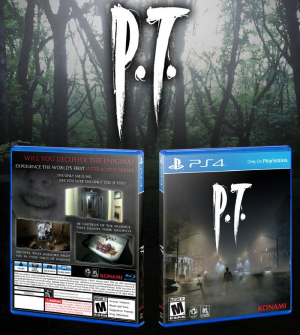
Hideo Kojima had an idea for a new Silent Hill game, the seminal horror game series from Japan. Good thing, too, as it had been a while since that series had a proper entry from its country of origin. He worked together with Guillermo del Toro, and cast Norman Reedus of Walking Dead-fame as the main character. I found out later that motherfucking Junji Ito was going to be responsible for the visuals.
Alas, Hideo Kojima was shafted by Konami, the company that employed him. This Playable Teaser was the only thing that ever came of Kojima’s grand design. It’s terrifying as all hell, though. Walking through the same corridor again and again, the player is plagued with ever more horrifying visuals and an unbearable sense of dread as a strange woman comes ever closer to you. The malformed baby crying in the bathroom sink is representative of the horror you are surrounded with, and not something I’ll soon forget.
The game is not even downloadable anymore in a rather Orwellian move by Konami – you’ll have to download a reverse-engineered copy on your PC. Don’t play if you have a heart condition, though, and I mean that. Kojima started his own company and brought del Toro and Reedus with him for his game Death Stranding (2019), a beautiful art piece that must be experienced. If you would like more P.T.-esque gameplay, Resident Evil (another seminal Japanese horror series) took note and created a similar and horrifying experience with its seventh installment.
5. Hotline Miami (2015, Dennaton Games)

Stumbling on this indie title by accident, the retro visuals and extremely fast-paced gameplay, combined with the techno soundtrack to end all techno soundtracks, hooked me and would not let go.
Yet, with its commentary on ultra-violence, the game felt quite disturbing at times. Like Michael Haneke’s Funny Games, the game asks the question why you enjoy hurting people so much. Where the first part followed a silent protagonist known as Jacket who obeyed messages on his answering machine that told him to murder entire groups of Russian mobsters, Part 2 follows myriad storylines in an achronological mesh of missions that at times turns into a fever dream (literally, in the case of the last, but chronologically middle, mission).
Not only does Hotline Miami evoke the style of the NES-games of the 80s and 90s, but, in keeping to these decades, the game is visualized as a stack of VHS-tapes that are played, rewound, and mixed (another Haneke-touch perhaps, where one character’s use of the remote control rewinds the film itself). If games are capable of asking postmodern questions in a slick style, Hotline Miami is proof of that capability.
4. SOMA (2015, Frictional Games)
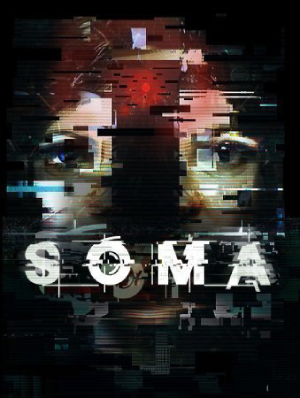
The second of four Scandinavian entries on this list, SOMA is another horror classic by the masters of Lovecraftian suspense, Frictional Games (seriously, what is it with Scandinavian countries and great video games? Googling this question gave me the rather simple answer that not having a lot of sun makes indoor hobbies more attractive).
In 2010 Frictional put Amnesia: The Dark Descent on the market, which changes horror games in a most definite way. Unable to fight back, and never sure where the monsters come from, Amnesia presented an atmospheric danse macabre that makes you break out in terror sweats.
Main developer Thomas Grip later called the game a ‘shallow fright fest’, and wanted something with more depth. Out came the psychological horror SOMA, where players take control of Simon Jarrett, a man who has his brain scanned after incurring cerebral damage from a car accident, after which he wakes up in an underwater facility in the year 2104. A meteor has destroyed life on Earth, and maniacal robots are out for Simon’s blood as he and fellow survivor Catherine Chun set out to try and preserve some facet of humanity with a mysterious space program.
SOMA is constantly being called less spooky than Amnesia, but a whole lot more psychologically scary. I call bullshit on that one, as SOMA still knows how to make me poop my pants. An incredibly memorable scene involves Simon traversing the bottom of a deep ocean trench, having no light sources to guide him, while an anglerfish keeps popping up out of the dark to try and eat him alive.
Psychologically, SOMA made me rethink my entire life philosophy. What makes an identity? What is our relation to our bodies? What experiences are real, and how are they formed? Be prepared for soiled britches, an existential crisis, and a landscape that looks gorgeously rotten. Make special note of Catherine’s monologue on the human connection: ‘I’m not religious, but I can see why people would be. The privilege of being makes a strong case.’
3. The Beginners Guide (2015, Everything Unlimited, Ltd.)
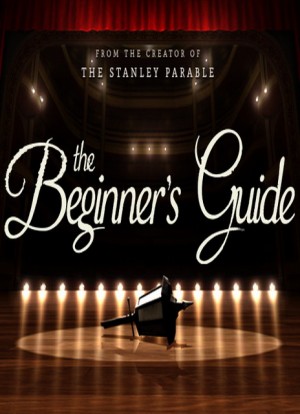
In 2013, Davey Wreden’s The Stanley Parable found its audience, and quickly became the postmodern deconstruction of video games. Office worker Stanley finds himself alone in his office building, while a narrator describes every move the player lets him make. Things quickly get weirder from there.
Saying more would spoil the unique experience, so I won’t. Davey Wreden himself quickly became an icon, and wrote a rather profound comic about the anxiety that came with newfound success and winning awards: ‘Like a drunk wandering from bar to bar looking for a fight, I am compelled by each new venue, each new possibility that this time a victory will temper the anxiety forever. I am drinking to solve the problem of being an alcoholic.’
This profound statement on the need for validation in order to give merit to delivered work became the basis for his next project, The Beginner’s Guide. Basically a film you can play (the entire process takes about 1,5 hours), the game follows Davey as he leads us through several artistic game experiences made by his unseen friend Coda, while Davey commentates.
I’ve really already given too much away, but the game is a philosophical experience that stays with you and is beautifully formed. An art installation in your living room, so to speak. To paraphrase a comment by Davey in the game: ‘If the validation I crave cannot come from others but has to come from myself, what would that even be like?’ I wish I knew, Davey. I wish I knew.
2. Inside (2016, Playdead)

After the beautiful silhouette that was Limbo (2010), Playdead gave us their second game, Inside, six years later. Without dialogue, instead using gorgeous visuals, a breathtaking ambient soundtrack and an intuitive player’s journey, Inside tells the story of a young redshirted boy who is hunted by ominous figures in masks as he tries to make his way through a immense facility.
Really, I can’t emphasize enough how gorgeous this game is. From the colors, to the varied locales, to the way every movement feels real and thought out, Inside is a profoundly influential experience. Side scrolling adventures without speech are the new indie genre to go for, it seems (see also the wonderfully creepy fairy tale-esque Little Nightmares (2017)). Give Inside a go if you’ve got an evening to spare.
1. Control (2019, Remedy Entertainment)

Remedy is, together with Frictional Games, the one game developer of which I would call every game a must-play. Starting in 2001 with Max Payne, a wonderful film noir pastiche with the most depressed main character in recent history, Remedy have consistently outdone themselves with unique ideas implemented in an exciting and fun fashion. In this past decade, they have produced Alan Wake (2010), a Lovecraftian thriller about a writer whose latest story comes to life and steals his wife; and Quantum Break (2015), a fantastic time travel action game with incredibly fluid gameplay and a nicely convoluted story.
But they outdid themselves last year with Control, the story of Jesse Faden, who finds herself trapped in Oldest House, the secret headquarters of the Federal Bureau of Control, which is tasked with keeping paranormal happenings under wraps. Rather reminiscent of the SCP foundation with its Lovecraftian horrors that Man Must Never Know About, Jesse finds herself fighting the Hiss, a non-Euclidian entity that corrupts all reality around it. Things really only get more unhinged from there. Jesse gets paranatural abilities and alien weaponry, enters the Astral Plane, and communicates with black pyramids that know all. The gameplay is excellent, the story is intense, and anybody who likes Lovecraft will be smiling ear to ear. Remedy, keep it coming, because this is excellent.
So ends the decade, and the joy of wondering what this next decade will bring. I haven’t been able to mention everything and it pains me, as games like Hellblade: Senua’s Sacrifice (2017), Bloodborne (2015), The Last Of Us (2013), BioShock: Infinite (2013) and good old Grand Theft Auto V (2013) deserve a mention. Alas, they weren’t the best (or I hadn’t finished them yet), but rest assured that anyone looking for an intelligent story will not be disappointed in the world of video games – you can even go online if you get bored.
Tom Breedveld is a bachelor in Film & Literature and works as a text writer now to pay for his master studies
Games, Lists, Tom Breedveld, 10.01.2020 @ 10:41







 RSS
RSS